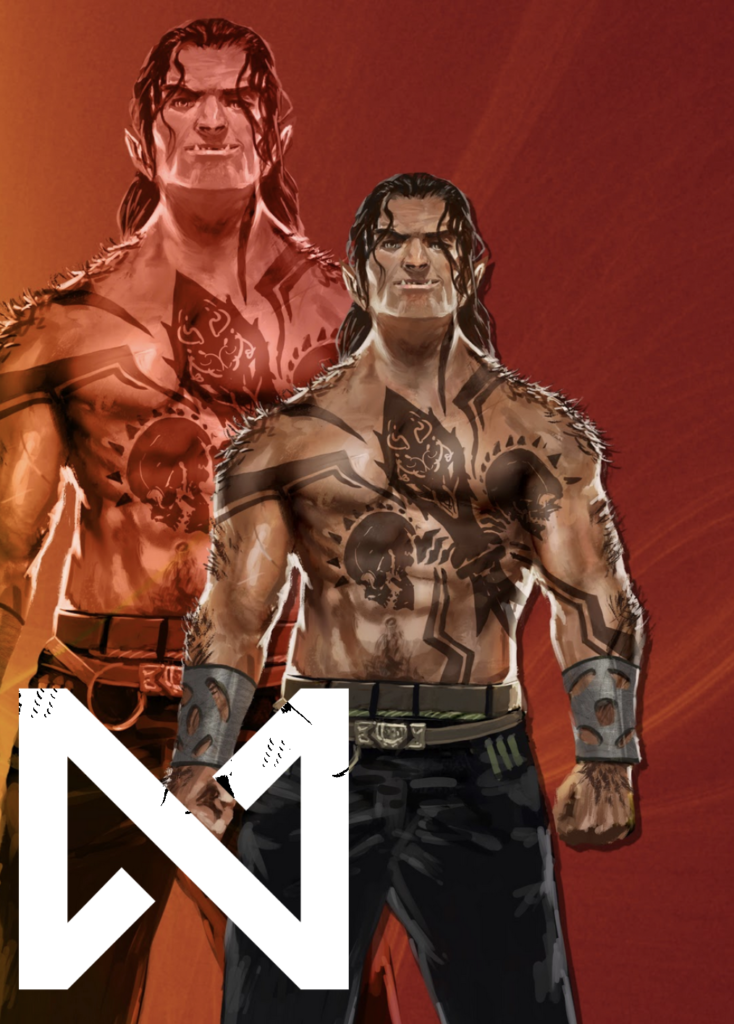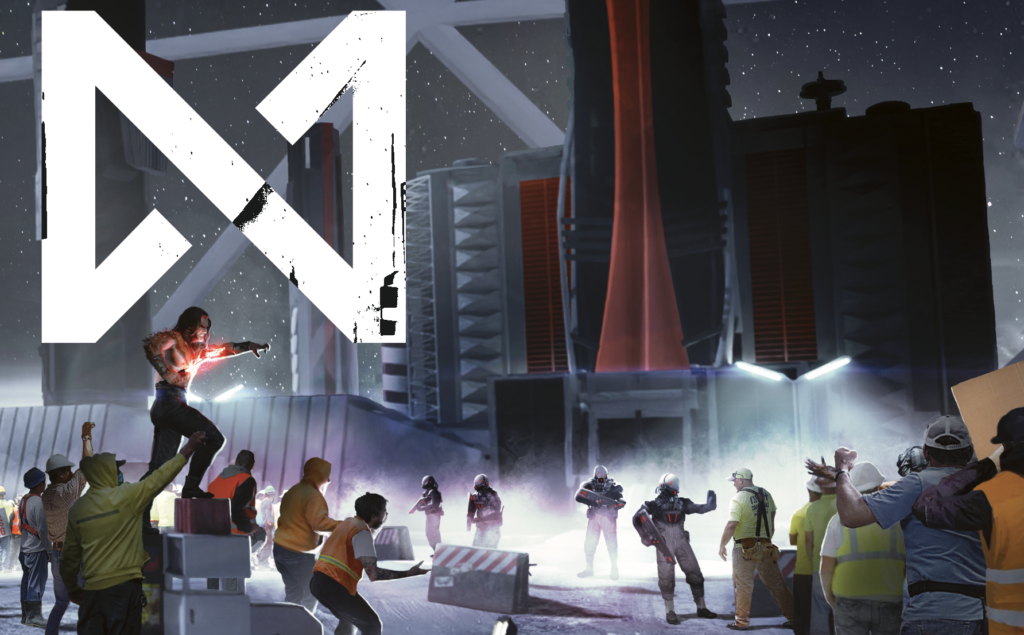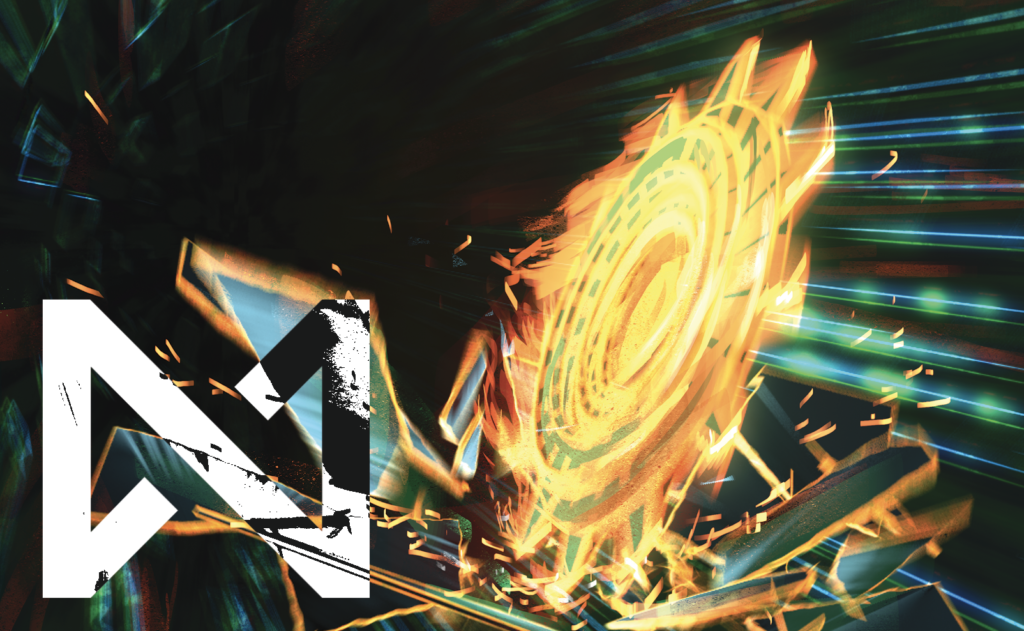Content warning: This story depicts recreational drug use and police violence.
1/
Loup awakens in a bleary haze, barely stirring, slowly taking in his surroundings. The ceiling looks like his, but that’s no guarantee he’s home. Those same cheap plascrete walls and ceilings are copy-and-pasted across the dozens of floors of housing tunnels which comprise Heinlein’s lower levels. It smells like home, but also like strangers. A lingering floral campfire scent explains itself as wisps of purple-gray smoke swim towards the dim overhead light. A hissing alto voice stumbles over a cough.
“I’m surprised you can manage without weights in your boots. You’ve been upstalk for how long?”
The voice’s owner is close by, lounging on a stack of pillows and passing a pipe. The long scaly tail of their g-mod wraps gently around Loup’s waist, buried in his fur. The sensation jogs his memory a little. He can remember dancing and flirting with them, the trip down to his apartment, their forked tongue. And there was someone else. Well, it’ll come back as he finishes coming down.
“Just a couple of weeks,” a second voice says from somewhere past the bed. Loup’s gaze turns towards the speaker, lingers on the stranger’s abs and hip bones, exposed as he struggles to pull his shirt over cat ears his muscle memory has yet to adjust to. He’s a couple years younger than Loup, tall but fragile looking. Likely why he was so nervous asking to come home with Loup. It was cute in a way, and Loup took a mischievous joy in making someone so shy and quiet say his desires out loud. “I thought I could start fresh, be myself. ‘On the moon, there’s nothing to hold you down,’ right?” he laughs.
“How’s that working out for you? Does Heinlein feel free?” the scaled stranger asks.
“Heinlein feels expensive.”
“Do you feel free?”
“What does that even mean?”
Loup sits up to join the conversation at last, tucking away a lock of his long, dark hair behind one pointed ear. “Freedom’s not a place you can go. It’s something you fight for moment by moment, it’s joy you steal in the margins. You can get it anywhere if you’re willing to scratch and claw.” He runs his nails across the lizard Wylder’s back in a gentle parody of his own words.
“Very funny,” they reply, ”but really, is that any way to live?”
Loup’s fangs peek out a little as he smiles and takes the pipe from the cat Wylder. Inside, embers blink out like a signal breaking up.
“Is domestication any better?” He smirks at the younger man, who feigns a smoky cough to hide his flustered expression.
“Think about it. When you work for someone else, doesn’t matter what kind of work it is, you rent out your body and your mind. You might as well be a Waldo with your boss’s boss’s boss’s hands on the controls. That’s sixty hours a week of beautiful, irreplaceable human life wasting away while you helplessly watch.”
“So that’s the big secret then?” the cat boy asks. “The key to freedom is unemployment?” Loup pulls him close, laughing.
“Smartass. It’s living a life where there’s no difference between what you think and what you do. It’s—hold that thought.” Loup’s PAD calls to him from across the room, tossed aside sometime in the whirlwind of the previous night. When he picks it up, he has a message waiting: “Where are you, bro? You know I’m sticking my neck out for you, right?” Loup curses under his breath. “I gotta go meet a guy about a thing, we should probably wrap this up. Oh, yeah,” he laughs, “what are your names?”

2/
It is unsettling to watch a nightclub sleep. With the music off and the lights on, Wyldside feels eerie and post-apocalyptic in its emptiness. Loup heads down a side alley, draped in a blue laser-cut tank-top that compliments his brown skin. He’s hauling a sophisticated-looking metal case that would be a burden in Terran gravity.
His contact, a barrel-chested man in coveralls, is waiting behind the club as promised. Tomohiro is a natural, but Loup is already daydreaming about how cute he’d look as a pitbull. “Remember, don’t leave a mess,” Tomohiro admonishes Loup, “if my boss finds out, it’s bad news for both of us.”
Tomohiro taps a datacard against a reader, and the door-sec system slides aside a panel, revealing a maintenance entrance. He hesitates for a moment, drumming his fingers against the card.
Loup sets a hand on Tomohiro’s shoulder, firm grip matched by firm gaze. “Come on, T, you can trust me.”
Moments later, Loup taps the datacard against another reader, granting him access to a commercial kitchen buried behind the bar. He hefts the case onto the counter and it opens with a hiss. One compartment boasts an eclectic assortment of vegetables, another, links of mock-sausage. Scanning the kitchen, he notices a jar of what look like dog treats marked with a glowing warning label, telltale sign of psychoactives. He swipes one and sets to work.
Before long, he’s in the groove. The walls breathe with an odd, reflective beauty. It never feels this way during a dinner rush, even when he’s high. Restaurant work turns an art form into an assembly line. But it’s a different feeling entirely, cooking for Make Lunch Not War. It feels like ingenuity and expression to scrounge up cast-off ingredients and make a great big pot of whatever-you-can-get-your-hands-on stew. But more than that, it’s a break from serving food he can’t afford to risties he hates. Now is his chance to do the opposite on his own terms. By the time Loup’s thoughts wander back to the kitchen, he’s nearly done cooking, and it’s time to head back to the lowest tunnels.
3/
In the lower levels of Lunacent, free food is a surprisingly tough sell. It’s not that people aren’t hungry or poor; disenfrancistos shuffle by in threadbare smart-fabrics that might even pose an electrocution risk. No, the problem is trust, community. Passing through the plascrete concourse, the closest thing the lower levels have to a social space, most residents drift from one densely packed corridor to another with their eyes on their feet or their PAD. Anyone who breaks that norm is probably selling something.
Nevertheless, the improvised food cart draws people’s attention. A wobbling homebrewed virt proclaims “FREE FOOD! MAKE LUNCH NOT WAR” above a chunk of transplas balanced on a crate and somebody’s bicycle. Loup chats and flirts with the other volunteers as they serve bowl after bowl of gumbo. Not everyone trusts the unlikely combination of ragged-looking punks, elders, and religious volunteers behind the table, but the spice-and-savory aroma makes its own first impression.
As afternoon turns to evening, Loup’s PAD pops up another message, Mirrah this time. “Have you been watching the general chat?” He hadn’t. “There’s a standoff outside that regolith processing plant, the one in the Docklands that Weyland took over. The accident yesterday was the last straw, workers up and walked out. They’ve been picketing the building, so big W sent in some Argus goons to stand there and look scary. It’s tense, people have been holding the line for hours. They could use some relief.”
“I get it, I get it,” replies Loup. “I’ll bring by some leftovers.”

4/
Headed towards the Docklands, Loup leaves behind battered plascrete tunnels. After hours of claustrophobia, the dome arcing overhead and the towering industrial buildings it houses make him feel insignificant and exposed. That sense of isolation gives way as Loup follows the sounds of frayed and ragged chanting to the picket outside the plant. Workers layering reflective vests over cheap envirosuits outnumber the prisec agents, but Argus troops get guns and coffee breaks. One agent chatters intermittently on a headset, but environmental noise and radio code make their messages hard to discern.
“You made it!” Mirrah’s voice booms, cuts through the background noise. She’s easy to spot, a head taller than the next biggest worker, thick muscled arms flanking a high-vis vest.
“You know I could never say no to you,” Loup smiles back, but Mirrah just rolls her eyes. The two set up on a utility table, serving up leftover gumbo to a half-dozen grateful and exhausted strikers. As a hot meal and a chance to sit down revive them, conversation starts to pick up, leaving Loup behind as an outsider. His attention is on Mirrah, but Mirrah’s attention is elsewhere. Before Loup can start to take it personally, he realizes why. She bolts up from the table, pointing behind Loup and away from the picket line. “Cops coming in, six o’clock! They’re trying to kettle us!”
By the time Loup turns, a formation of Port Security is already closing in with riot shields and electrified batons. Argus agents are peppered throughout the rent-a-cop line with crowd control artillery. They must be the ones calling the shots. A cop with a megaphone shouts orders at the crowd, but they’re drowned out by a tempest of curses and chants.
“I thought cops don’t come around here?” Loup asks, equal parts quip and earnest question.
“They don’t,” answers Mirrah, “unless the corps let them in.”
An overeager officer fires a small explosive at the group, kicking off the police riot. The press releases always say these rounds are glorified firecrackers, meant to strike the ground and overwhelm your senses. Loup knows better. Aimed at your face, those things can kill. Thinking fast, he sacrifices the insulated case to shield himself.
“This is bad. We’ve gotta get out of here while we still can.”
Mirrah flips the table, sending the food flying. Broth splashes and pools underfoot as the group huddles behind for cover. They start to push forward behind their makeshift shield when they are met by a barrage of stinger balls. The “less-lethal” grenades spew rubberized ball-bearings indiscriminately, denting and embedding themselves in tables, shields, hard hats, people. It’s only going to get worse, so Loup and Mirrah’s group push on relentlessly. When they collide with the police line, a hail of baton strikes crashes against and over the shield. Loup’s vision lights up for a moment, and he feels a warm trickle of blood running down his forehead. He keeps pushing, a raging river of adrenaline between him and the pain, and—
There! A break in the line! Bursting through, the crush of bodies parts. The baton strikes cease. They’re through.
Scanning for escape routes, Loup spots two cops closing in on a small man in a reflective windbreaker, while a third wrenches the man’s wrist into a hold. He tries to twist his wrist towards the attacker’s thumb and fingers and pull, breaking the grip with his radial bone, but he isn’t strong enough. Mirrah sees this too, and the same calculation goes through both their minds. Right now, they’ve got a numbers advantage, but they have to act fast. Mirrah steers the group, pivoting to wedge the table between and cut off the other two cops. Loup and another worker break off from the rest, swooping in from the side and carrying the would-be arrestee away. The whole thing happens in a matter of seconds. They leave the table behind and keep running. Loup carries the small man on one shoulder like a sack of flour, easy in lunar gravity, while his other hand digs in his pockets. He fishes out Tomohiro’s datacard as the group rounds a corner, and they disappear into a service door.
5/
Loup shambles home through a circuitous path of service tunnels and maintenance rooms. He stops to change into a spare pair of coveralls in a locker room, a flimsy attempt to avoid matching a description. He’s a distinctive looking guy, but nobody looks too closely at you if you’re pushing a broom. Stripping his disguise off after arriving home, he reads the embroidered name badge and wonders if he’s gotten this Jesse in any trouble.
He knows jacking in this soon after a concussion is likely dangerous, but he’s too furious to settle down. He opens his console, a sleek case turning into gaping jaws, virts projecting from every side. The skulljack slides magnetically into place as a haptic click runs down his spine, and the world drops away.
The first thing Loup sees is the moon overhead, looming large. It’s too close, and radiating light like a thumb pressed against Loup’s eyelid. At first, it’s just a glowing disc, but as he sinks deeper into alignment with his console it divides—not one object, but thousands of interconnected tendrils of silvery light. He feels its pull and does not resist, floating through the oil-slick shimmer of netspace.
Loup’s avatar is itself a being of glowing light. Netspace completes the transformation his meatspace augmentations only hint at. His muscled frame takes on a digitigrade hunch, a wolf on hind legs, as glowing threads of silvery-red fur cover his body and his jaws extend into a snout. His tongue lolls out past radiant fangs. The hunt is on.
With a reflex, more than a thought, he loads up the icebreaker programs he’s honed and refined in previous runs. His right claw grasps a cleaver; ink-dark, reflective, and crackling with red-hot energy. His left conjures a whirling blade of orange-green light. He ascends.
As Loup approaches the moon, those wisps of silvery light begin to form a clear picture, datastreams connecting locations he recognizes. Floating towards what must be the Docklands, one point stands out. A stock-standard pillar of white light looks to correspond to the processing plant. Makes sense: a new acquisition that hasn’t been customized. He doesn’t really know what he’s looking for yet. Maybe there will be incriminating documents or remote access to machinery. Maybe there’s fragile network infrastructure for his console to feed on. He starts the run, plunging into the white light.
The first piece of ice Loup encounters towers over him, a white picket fence glitched and distorted by cerulean blocks of data. The off-the-rack obstruction confirms his suspicions: the simple choice of a sysadmin who doesn’t want to fill out the paperwork to license anything. Loup channels power to the cleaver, and chops his way through the wall with the fury and inevitability of a horror sensie axe murderer. His head aches, but he barrels through, carried by momentum and rage. That’s when it all goes to hell.
In the blink of an eye, Loup comes face to face with the barrel of an ominous-looking piece of Weyland ice. It’s not familiar, but he knows a destroyer when he sees one. The sharp bolt of blue-green light gives it away. Maybe he was overconfident, or maybe he just got played, but he was wrong. With a thundering crack, the bolt screams towards Loup, and he lifts his cleaver on reflex, shielding his face. On contact, the dark gloss of the cleaver shatters, its red glow dissipating. Charging past, Loup readies himself to breach the server.
I won’t be getting in here again, he thinks. Let’s make it count.

